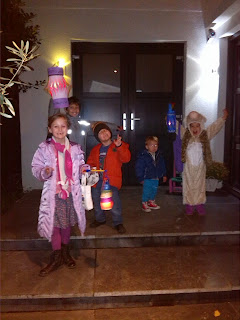Why?
It's taken me a long time to start to write this post. Mainly because our experience so far has been much harder than we expected. We decided to send our 7 year old ('A') and 5 year old ('I') to a Dutch school for a few reasons, mainly:
- This would be a great opportunity for the children to learn a new language. If we had remained in England, the children would not learn a new language until they were 12 years old.
- There were no spaces in the International School in Amsterdam when we moved here.
- We wanted the children to mix with local Dutch children and fully experience Dutch life.
The First Dutch School
Shortly after finding out we were moving to Amsterdam, we discovered there were no places available at the international school (the one which costs EUR6K per annum per child, not the one which costs EUR15K per annum). We then decided to send our two oldest children to a Dutch school.
There was still uncertainty about where we were going to live. We'd been to visit Haarlem and loved the idea of living in a large town by the sea. My husband moved to Amsterdam in August, coming back to London at weekends, while the children and I remained in our family home in North London. We hadn't found a rented house yet, or found tenants to rent out our house in London.
After phoning a few Dutch schools, which involved my husband and I hovering over a laptop and Skyping on Friday afternoon's, when he had come back to London. We discovered we wouldn't be taken seriously without an address in Amsterdam. My husband then signed a rental agreement on a property in the southern most tip of Amsterdam and arranged visits to four schools within 5km of our property. Only one school had places for both our children. It sounded like a great school though and we felt very fortunate to have been offered places.
We niavely started the children at school at a time where our cultural differences were magnified. The run up to Sinterklaas's arrival in Amsterdam (see http://kidsandclogs.blogspot.nl/2013/10/midget-golf-and-black-pete.html). This freaked us out. A lot. Despite the racist undertones, which seem to be considered normal and even fun in NL, the new school was very welcoming. A new building was about to be built and the old building knocked down. This was good news as both the children would be housed in the same low-rise block, while the old school was being demolished. This was great, I thought, they will be together and take some comfort from that. What wasn't great was that my daughter was to walk 20 minutes each way to access a gym facility and a playground.
The school finished at midday on Wednesday's and Friday's, which I found challenging as it meant two afternoons to entertain the three children. I didn't find making packed lunches too bad, although the children missed their hot meals from their previous school. I was happy with our 15 minute cycle ride to school, but it soon became apparent that we lived far away from school, compared to the other families. I was really looking forward to the children playing out on the street with children they knew from school. I could have maybe tolerated these issues, but the biggest problem I had with the school was the lack of support we were given with my 7 year old learning Dutch.
Two weeks after the children had started school, following a two week holiday in October, I had a meeting with A's (my 7 year old's) teacher. Apparently, all extra classes for Dutch lessons for non Dutch speaking children were full in the area. Priority for additional help was given to children who didn't speak English. I was told that 'A' would learn Dutch by sitting in the classroom and listening to the 'klunker', (the sounds). 'A' would come home each day, extremely happy with piles of beautiful drawings and models she's made out of cardboard. One day she had produced an entire range of greetings cards for every occasion. While the other children were learning maths, spelling and geography, 'A' was reading Harry Potter in English. My 5 year old was happy as there was another English boy in his class who would tell him what was going on.
The Second Dutch School
As we're Jewish, I went to synagogue one week and met some local mums who all sent their children to the Jewish primary school, which also happened to be very close to our rented house. We didn't so much as look at this school when we moved here, as I was told it was a very bad school by someone who lived in Amsterdam and also, because we thought we would try a non religious Dutch school. The children had attended a Jewish community school in London and we fancied a change. However, after meeting these mums who all said positive things about the school, I thought I would go and look at the Jewish school. After being told off by the deputy for believing in gossip, I was amazed by the school. It was huge, the building was modern and only six years old, had two gyms, a huge assembly room, classrooms were kitted out with electronic white boards and there were floor to ceiling windows all around. More importantly, they had a dedicated, teacher trained to help children learn Dutch and I was promised the children would receive 6 hours of help learning Dutch each week. After 6 weeks in the first school, we moved them to the Jewish school nearby in mid-December.
The children were very happy to be in the Jewish school as the routine and calendar year were familiar to them. It's not a very religious school, but the values they are learning are close to our hearts. I was so happy to see the children celebrating the birthday of the trees after the Black Pete business! We've been very happy with the communication from the school and the support our children have received to learn Dutch.
It's been a very difficult journey, particularly for 'A'. In 6 months, she only said one word in the classroom. The first parent/teacher meeting we had with 'A's' teachers, there was a strong chance 'A' would have had to redo an academic year. She was struggling with everything. She missed her friends. She was angry with us and with the school. She didn't want to learn Dutch in case it made her forget how to speak English. She was loosing her memories of her life in England and it really bothered her. One day she said, 'I feel like I am lost in a dream and I can't get home'. A request to complete a basic maths worksheet would result in a massive tantrum. All she wanted to do was watch TV. We watched her go from being a happy go lucky 7 year old with a lot of friends, to being introverted and lacking in confidence. She cut off her long hair herself and wore different outfits each day. One day she put on her 5 year old brothers clothes to look like a boy, the next she wanted us all to look smart. It was as if she were trying to find a new personality.
As I have said previously, it has taken me a long time to write this post. I didn't want to write until there was a glimmer of hope to write about, and quite frankly, since October (it is now May) there really hasn't been much of one. However, today, I had a meeting with 'A's teachers. They are pleased with her progress and think her attitude has changed. She will be allowed to go to the next year group. Last week she read some Dutch out loud in class. I'm still not sure if we made the right decision and I am still feeling guilty about what we have put her through. I've not yet witnessed her talking Dutch to another child her age and playing in Dutch with them. I think I won't fully relax until that happens.
Our 5 year old son, 'I' has found the transition from England to a Dutch school slightly easier. He hasn't really made friends yet, not in the same way as he had friends in England. He still hasn't had a playdate, though it doesn't seem to bother him. I'm hoping that from September, socially it will be easier for him when he moves from Groep 2 to Groep 3. In Groep 3, a new class is formed from the oldest children in the current three classes of 4-6 year olds. 'I' has begun to participate in sport after school two days a week, which he's really enjoying.
I have heard that the first 6 months would be the hardest. For us it felt more like 7 months. Perhaps because I was aware of the 6 month threshold, I have been counting the days and when it arrived and we were still having a rough time, it felt even worse. Now the weather has improved and I decided to cancel A's weekly Dutch lessons, so we could spend more time outdoors together, it feels like some of the pressure has been lifted. I still think we have a long way to go, but a lot of the initial fear and darkness has begun to fade.




























+Children+of+the+Sea.++1872+(2).jpg)